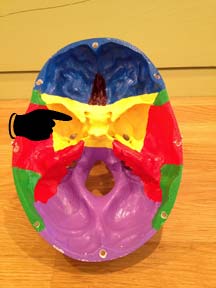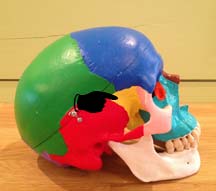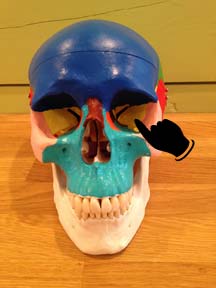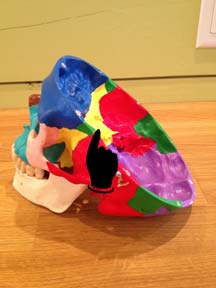
The sphenoid is a butterfly-shaped bone inside the skull. CranioSacral therapists and many Osteopaths recognize the importance of the sphenobasilar joint (the joint of the sphenoid and the occipital bone) to overall health. The sphenoid’s relationship with the occiput is critical. Because of its location it can affect the pituitary gland, the nervous system and blood flow to and from the brain.
The sphenoidbasilar joint (SBJ) is often viewed as the key joint in the body. William Garner Sutherland, DO (1873-1954), who is often described as the father of Cranial Osteopathy, felt that all the other bones in the body move to accommodate the SBJ, which is why it is so important to have a functional SBJ. He was interested in freeing the bones and sutures of this area in order to positively affect the rest of the body.
In my own experience with my clients I have discovered that assessing and releasing any restrictions of the sphenoid have far reaching effects. Clients often notice a change during or immediately after their sphenoid returns to a functional position. As is true with all CranioSacral Therapy, the movement is extremely subtle and minute. Some clients don’t feel anything, but usually their symptoms improve following treatment.
A dysfunctional sphenobasilar joint can cause or contribute to symptoms such as:
- Migraines
- Headaches
- Sinus problems
- Obsessive-compulsive behavior
- Head, neck and back pain
- Scoliosis
- Eye motor problems
- Endocrine disorders
- Allergies
- Temporomandibular joint dysfunction (TMJ)
- Pain syndromes
- Personality disorders
- Learning disabilities,
- Eye/motor coordination problems
- Reading problems
- Emotional problems
- Depression
- Childhood autism
To release restrictions of the SBJ I use techniques from CranioSacral Therapy. By placing my thumbs on your temples and cupping the rest of my hands around the back of the head, I will gently assess the movement of the sphenoid, and use about 5 grams (the weight of a nickel) of pressure to invite the sphenoid to reorient itself. The work is very gentle and relaxing.
Addressing dysfunction of the sphenoid may not solve all of your problems, but it might just make your life a little better. If you have any questions, or would like to try a CranioSacral Therapy session in Austin, TX, please call me at (512) 964-9250.


